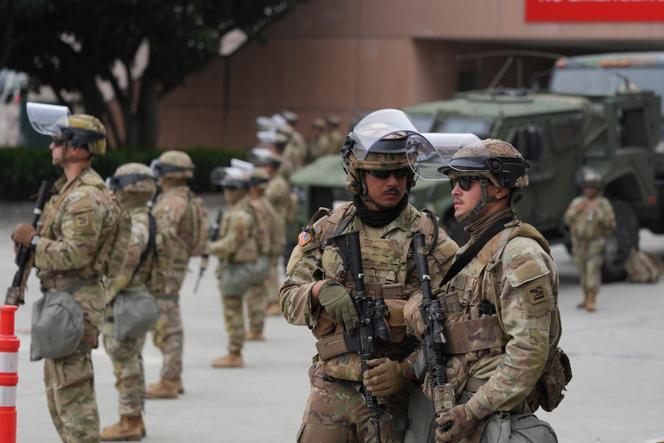Federal Troop Deployment in Los Angeles: Legal Challenges and Constitutional Debates
Examining the Legal Controversies Surrounding Military Presence in California
The recent decision by the Trump administration to station federal troops in Los Angeles has ignited a multifaceted legal controversy involving questions of jurisdiction,constitutional authority,and civil rights protections. Central to this dispute is the interpretation of the Insurrection Act, which grants the president certain powers to deploy military forces domestically under specific circumstances. California officials contend that this deployment, executed without the state’s consent, possibly breaches the Posse Comitatus Act, a federal law that restricts the military’s role in civilian law enforcement.
Legal analysts emphasize several critical concerns arising from this intervention, including:
- Due process issues related to arrests or detentions carried out by military personnel.
- First and Fourth Amendment considerations involving the rights to free speech, peaceful assembly, and protection against unreasonable searches.
- Heightened federal-state friction that could lead to extended legal disputes or legislative responses.
| Legal Dimension | Potential Conflict | Applicable Law |
|---|---|---|
| Federal Authority | Extent of military deployment | Insurrection Act |
| State Sovereignty | Requirement of state approval | Posse Comitatus Act |
| Civil Liberties | Management of protests and searches | First & Fourth Amendments |
California’s Legal Opposition to Federal Military Intervention
In response to the federal troop deployment, California’s government has promptly initiated legal action, challenging the legitimacy of the military presence authorized by the Trump administration.The state argues that the federal order surpasses constitutional boundaries and undermines California’s sovereign authority, igniting a pivotal debate over the distribution of power between state and federal entities. Experts caution that this case could establish a critically important precedent regarding the use of active-duty military forces within U.S. borders during episodes of civil unrest.
California’s objections focus on several key points:
- Constitutional restrictions: The Posse Comitatus Act’s limitations on military involvement in civilian policing.
- State jurisdiction: The absence of adequate consultation with state officials prior to deployment.
- Potential infringement on civil rights: Concerns that military presence may exacerbate tensions and violate individual freedoms.
| Issue | California’s Argument | Federal Government’s Defense |
|---|---|---|
| Legal Authority | Deployment exceeds statutory limits | Necessary emergency action to restore order |
| Coordination | Insufficient state-federal dialogue | Urgency justified rapid deployment |
| Civil Rights | Risk of constitutional violations | Focused on ensuring public safety |
Federal-State Dynamics and Constitutional Boundaries
The deployment of federal troops in Los Angeles has reignited longstanding debates about the balance of power between state governments and the federal executive branch. California officials assert that such military intervention infringes upon state sovereignty and raises profound constitutional questions about the limits of presidential authority in domestic affairs. The Posse Comitatus Act plays a pivotal role in this discourse, as it restricts the military’s involvement in civilian law enforcement absent explicit congressional approval. This legal ambiguity has spurred litigation and intensified scrutiny of the administration’s interpretation of federal powers.
This controversy highlights broader tensions in the division of responsibilities for law enforcement and public safety. California’s lawsuit underscores fears that federal actions could establish a precedent for circumventing state governance in areas traditionally managed locally. Central issues in this debate include:
- Constitutional authority under the Insurrection Act and related legislation.
- Presidential limits on unilateral troop deployments.
- Necessity of state consent for federal intervention in maintaining civil order.
- Implications for state autonomy when facing federal involvement.
| Topic | Federal Perspective | California’s Viewpoint |
|---|---|---|
| Legal Grounds for Deployment | Invokes Insurrection Act authority | Argues unconstitutional without state approval |
| State Sovereignty | Federal needs supersede state objections in emergencies | States retain primary law enforcement powers |
| Military Role in Civilian Affairs | Troops essential to restore public order | Military presence risks escalating unrest |
Guidelines for Resolving Constitutional and Legal Conflicts
Addressing the intricate legal challenges posed by federal troop deployments within state boundaries requires a nuanced approach that balances executive power with respect for state sovereignty. Significant factors to consider include:
- Awareness of Posse Comitatus Act restrictions: This law limits the military’s role in domestic law enforcement unless Congress explicitly authorizes such actions.
- Careful application of the Insurrection Act: While this statute permits presidential intervention during insurrections or civil disorder, its scope is often subject to judicial interpretation.
- Respect for state governance: Governors generally hold primary obligation for public safety, and unilateral federal deployments may provoke constitutional disputes.
Legal authorities recommend that federal and state officials engage in transparent communication and coordination before initiating any military involvement to minimize protracted legal conflicts. Courts tend to favor collaborative efforts that clearly define jurisdictional boundaries and authority.
| Authority | Scope of Power | Legal Limitations |
|---|---|---|
| Federal Executive Branch | Authorized to deploy troops under specific statutes | Constrained by Posse Comitatus and Insurrection Act provisions |
| State Governors | Control National Guard and local law enforcement agencies | Responsible for public safety; can oppose unauthorized federal actions |
| Judicial System | Interprets constitutionality of troop deployments | Ensures balance of power and protection of civil liberties |
Summary and Future Outlook
The deployment of federal troops to Los Angeles has brought to the forefront critical constitutional and legal questions about the limits of executive power and the preservation of state sovereignty.California’s legal opposition highlights the ongoing struggle to define the appropriate roles of federal and state governments in managing civil unrest. As this dispute progresses, judicial decisions and political developments will be closely monitored for their potential to reshape the framework governing military involvement in domestic affairs, with lasting consequences for the balance of power in the United States.




